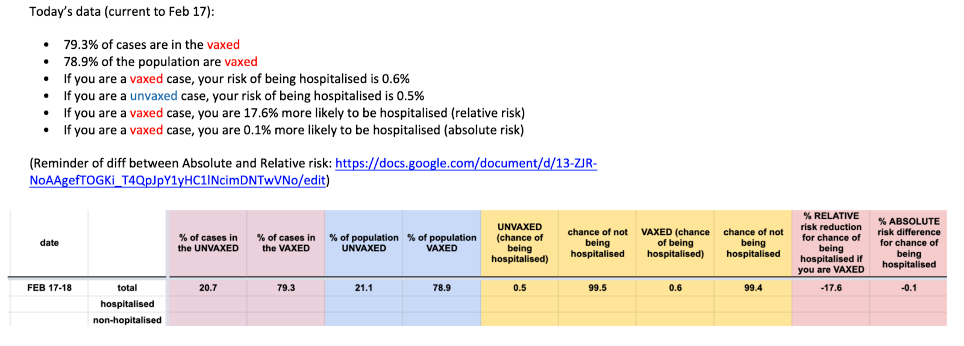Table of Contents
Guy Hatchard PhD
HatchardReport.com
Formerly a senior manager at Genetic ID a global food safety testing and certification company (now known as FoodChain ID)
To: Dr Paul Hunt
Chief Human Rights Commissioner
From: Guy Hatchard PhD
23 February 2022
Dear Commissioner
Thank you for providing the opportunity to present to yourself and staff yesterday afternoon. I did so as an individual scientist but on the invitation of Voices For Freedom. I remain independent of groups, but maintain communication with many groups and colleagues on scientific issues. I am not a protestor, nor do I have any history prior to the pandemic of publicly opposing vaccination.
I am formerly a senior manager at Genetic ID a global food safety testing and certification company (now known as FoodChain ID). I am a long standing advocate of the benefits and safety of those natural approaches to diet and medicine which have been adequately scientifically verified. I have my own website, HatchardReport.com. At the conclusion of the meeting you said that the HRC would make a public statement and left the participants free to make public statements themselves. Thank you.
This morning I read your public statement following the meeting which affirms that you feel a duty to listen, and adduces “It’s clear that the protesters who I have met with have very real stories of loss and suffering. They feel broken and discarded due to the impact of Covid-19 health measures on their lives.” You also expressed a measure of caution.
As a person experienced in the analysis of data and the assessment of scientific information, I am increasingly aware of deficiencies in official NZ pandemic data and its use to support continuations of now outdated government policy. Outdated government policy and incomplete official data directly impacts the rights of individuals.
For example, since 21 August 2021, the Ministry of Health (MoH) has been publishing data related to the Covid outbreak in a cumulative fashion. This data shows that 60% of cases occur in the vaccinated (against a vaccinated population rate of 79%), and that 70% of hospitalisations are among the unvaccinated. This appears to strongly support vaccination, however, it is misleading due to the cumulative nature of the data, (and incidentally because of the way vaccination status is categorised). Cumulative data only reveals the average of the whole outbreak, not the current daily and weekly trends.
Since October 2021, members of my support team have been calculating ‘snapshots’ of data by subtracting report data from each subsequent report. This has allowed me to see the current burden of cases by vaccination status for any specific time period, and to calculate the hospitalisation risk disparity for cases by vaccination status. Below is an example of the data between February 17 and 18:
Snapshot data

This snapshot data paints a very different and relevant picture. It is indicative that during the present phase of our Covid outbreak, those that are vaccinated may be at slightly higher risk of hospitalisation than those who are unvaccinated. The general trends and overseas data support this concern. You will be well aware that this is in contrast to government and media messaging strongly encouraging booster vaccinations as essential.
If you ignore the crucial issue of very high rates of adverse effects, this could possibly be supported by the historical cumulative Covid data, but it is certainly not supported by current data. The reason for the ineffectiveness of mRNA vaccination must also be obvious to you from yesterday’s presentations and the supporting submissions provided to you by presenters. The characteristics of Omicron are quite different from those of Delta.
Omicron is a variant that has adapted to prefer infection of vaccinated individuals.
From the perspective of genomics, this results from the well-documented path of viral evolution.
I note that Medsafe has admitted in small print on its website, generally unnoticed and uncommented by media, that the phenomenon of vaccine acquired immune deficiency (which I allude to above) is a risk about which they have concern.
The Human Rights implications of this are also obvious. Incentives and encouragement to vaccinate, when its benefit is in doubt, but the risk of harm is well documented, do not amount to a process of informed consent or medical risk mitigation. Today in your public statement you clearly extend personal sympathy to those affected by adverse vaccine reactions.
Many among the wider population are becoming aware of risks through personal experiences. For example, a friend of mine is a director of a large business, one of his relatives has been affected by myocarditis, but his work colleagues remained sceptical of any risk. Recently the father of one of their employees had a booster shot immediately followed by a massive heart attack. As a result, the opinion of his colleagues has swung back in full support of my friend’s informed choice. This kind of experience is reforming public opinion up and down the country (and even I have heard in Parliament). It is no surprise that booster uptake has barely reached 50% of those eligible.
I come to the point of my writing, in addition to a big thank you for taking the time to listen at length, I submit that the human rights abuses are a matter of daily misery for many, extending to some dramatic and devastating personal health impacts which are escalating as booster shots are rolled out.
In my opinion, it is not tenable to delay action.
The government has curated extremes of public opinion fearful of Covid outcomes, in favour of experimental mRNA vaccination, and prejudiced against those reluctant to vaccinate. As you know, this has extended to punitive measures. As published evidence has accumulated which points to increased health risks of vaccination and therefore a need to revise policy, the government has dug its heels in and doubled down on announcements of vaccine safety and effectiveness. The Ministry of Health’s restricted presentation of data along with its refusal to institute mandatory reporting of adverse effects verges on the deliberately misleading and implies a cover up.
I surmise from your extensive history of supporting human rights, that you will know there is a fine line between unfortunate mistakes and deliberate suppression of fact.
I believe that line is now being crossed in New Zealand.
Leadership in this situation involves a willingness to speak up, even if the message may be unwelcome, and a capacity to change direction. Every day that passes by without action means growing economic misery and exclusion for some and crucially some serious health incidents for others. There is an imperative for the Commission to stand up and say unequivocally there is a case which has been made and needs to be answered. A case that requires an open public dialogue.
Therefore I warmly welcome your statement:
“The job given to the Human Rights Commission, Te Kahui Tika Tangata, by Parliament is to listen, conciliate, educate and advance human rights and responsibilities for all”
I am asking you here to follow this statement with a timely call for a wider public process that will go beyond a possibly poorly informed, and certainly based on past experience, opaque review confined within the corridors of parliamentary power. The HRC is there to protect and uphold rights independently from parliament. As I indicated in my submission, incidence of adverse effects and death proximate to Covid vaccination in NZ and elsewhere have far surpassed thresholds set by medical ethics and protocol that should also trigger an immediate pause in vaccination.
This is not a time to delay, the situation has already passed beyond a point requiring prompt action. Can you please advise me of the intended HRC time frame?
I will, as you have already indicated I may, make this statement publicly available.
I look forward to hearing more from the Commission shortly. I remain ready to provide any scientific information you need within a short time frame. As you know, I have already submitted to the HRC a list of 1000 published papers on adverse effects of mRNA vaccination.
Yours sincerely
Guy Hatchard PhD









